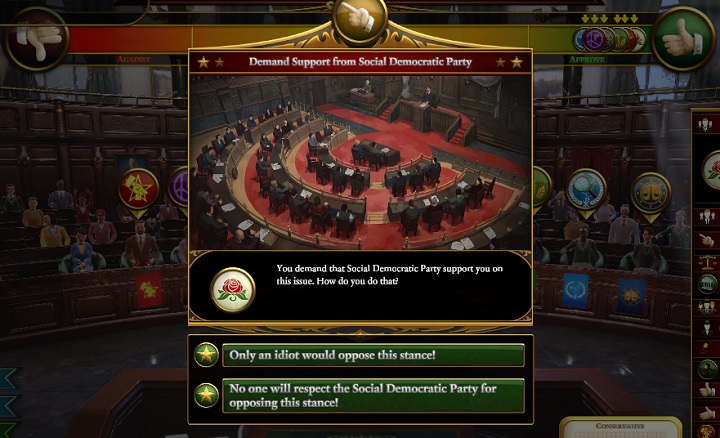Exerting influence | Politics
In the following chapter you will find a lot of advice concerning exerting influence and pressure on the representatives of political parties, in order to make them support the motions you have put forward. The actions, which you must take are different for each specific case, but it is possible to adopt one proven tactic, which gives you a large chance at having all of your resolutions approved. Individual issues have been described in their own separate sections.
When to influence a vote
Depending on the importance of the motion you submit, you have to decide whether it is worth influencing the result of the vote. First, you must verify whether or not the initial support guarantees that the resolution will be approved.
If the scale of support is majorly in favour, than you should not, under any circumstances, influence the vote. The situation is the same, when the initial stations suggest that the project is almost certainly going to be rejected. Trying to change something in these situations will only worsen your relations with individual parties, and you will not gain anything for it. It is worth primarily looking into the stations of parties which hold the majority of votes within the Council. If you do not constantly keep track of this, than it is worth paying attention to the headlines of newspapers, which quite often appear on the screen.
The optimal situation for exerting influence exists when most on the Council members do not openly oppose the resolution, but the scale of the vote is not clearly indicating either of the possible results. Of course, before you take action, it is worth checking the political goodwill modifiers of each party. If you have recently made numerous attempts at influencing the results of a vote, than your chances to sway the current vote may already be non-existent. If the Goodwill modifier is a negative number (between -5 and -10), than it is best that you do not engage into any actions with the representatives of this party, and wait for your relations to improve.
Selecting parties
If you have decided, that you will nonetheless fight to push the resolution through, than firstly you must conduct a selection process amongst the parties, that are currently sitting in the City Council. The earlier in the game it is, the easier it will be to achieve this, however, the interface is quite friendly in this area, and even with a larger amount of parties, you should not have any issues.
First of all, note why certain parties oppose or support the motion. You can do that by pointing the cursor at the symbol of any party, which you will find on the support axis. Most often the initial opinion will be dictated by the political compass and in this area you will not be able to act, but it is worth familiarizing yourself with the value of this modifier, as in most situations it will be the value you will have to counteract with your own actions, in order to convince the party members to support your motion.
Remember, that ineffective action will only worsen the situation, so make sure to at least get a grasp of the political priorities of each party and choose to cooperate with those, that support your point of view, e.g. you want to fund a new police department, but it is expensive enough, that the City Council does not want to support the project. Check, which party has Security in their agenda and try to strike in this direction. You should keep in mind, that exerting influence results in a long-term penalty in relations, so limit your actions to when they are absolutely necessary.
Selecting means
You can exert influence in three different ways. You can request that parties support you, you can make demands or you can threaten their members. All of these activities can be done by using the interface, if they are available at the moment.
It is important, that after you choose one of the three previously mentioned options, you must use it. Before you pick any of them, be sure that you want to influence the party this way, as after you open the panel of a specific mean of influence, there will be no going back. Requests are of course the least effective way of influencing, but you can use them when dealing with parties which support you, but the project is not in line with their ideology. Remember, that after you pick a request, you will have to characterize it. You can outline your own political goals, or the good of the citizens. If the goodwill modifier is at least 5 or higher, than presenting your own goals will be more effective. When the modifier is between 0 or 5 points, it is best to use the needs of the citizens as your bargaining card. The effectiveness of the request also depends on the party’s support of a certain idea and your support amongst the citizens.

Demands and threats are way more effective. The latter are best suited against parties which you have been recently spying on. Spying itself costs about 20k of your personal funds, so you should infiltrate the parties which hold a majority in the City Council. Demands can be made when parties favour you, and also when your relations are not the best. For demands you will always find more rational arguments, which will allow you to pick the line that is best suited to its recipient.
Final effect
Keep in mind, that your action will quite often produce the opposite effect to the one you were hoping for. Situations of this type will occur when the party’s political compass resulted in a neutral position, and you chose the wrong action and have lost the support for the motion while gaining nothing in return. This is why it is important, that you make your first attempts at influencing right after the project is submitted, and only when it is necessary.
Thanks to this, you will be able to correct your decision or to follow through with it, in order to make the final result favour your ambitions. Party goodwill returns to original values after some time, so if you anger the politicians too much, withhold from submitting any substantial projects for several months.
You are not permitted to copy any image, text or info from this page. This site is not associated with and/or endorsed by the Kalypso Media or Fragment Production. All logos and images are copyrighted by their respective owners.
Copyright © 2000 - 2025 Webedia Polska SA for gamepressure.com, unofficial game guides, walkthroughs, secrets, game tips, maps & strategies for top games.
